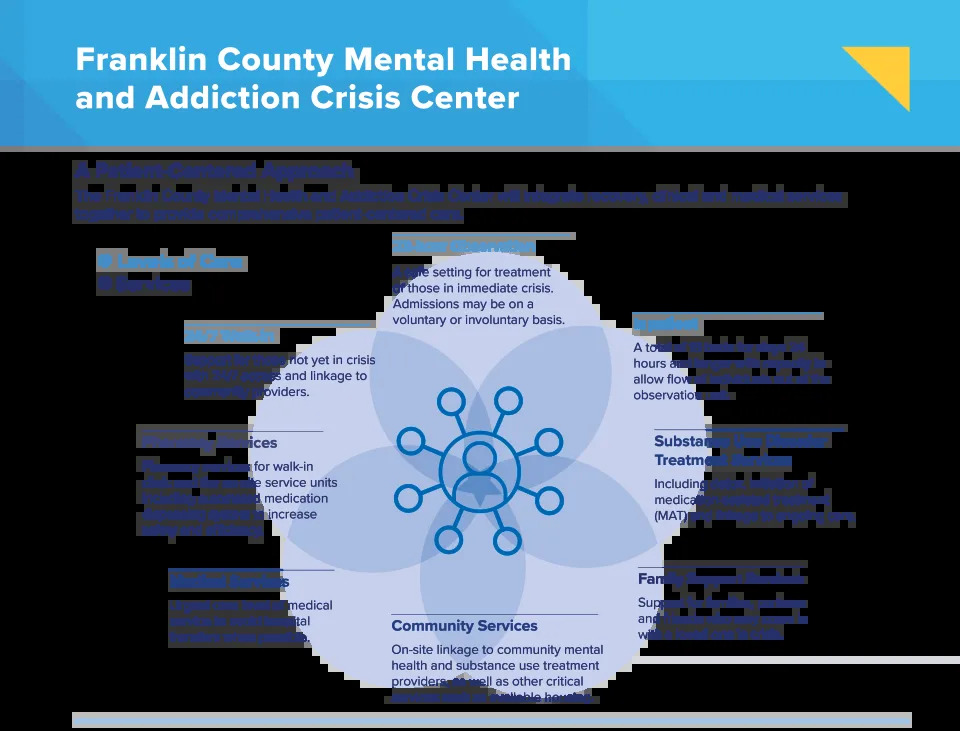>>A Rural Hospital’s Excruciating Choice: $3.2 Million a Year or Inpatient Care?
December 11, 2022>>Staffing crisis at Kansas mental hospital deepens. What will lawmakers do next session?
December 15, 2022Our view: ‘Warm, welcoming’ $59 million crisis center will be game changer for Columbus
If all goes as planned, ground will be broken next month on a game-changing, patient-focused facility designed for those in the midst of mental health and substance emergencies.
Columbus City Council on Monday will be asked to rezone land for the $59 million Franklin County Mental Health and Addiction Crisis Center on Harmon Avenue spearheaded by Franklin County, Alcohol, Drug and Mental Health Board of Franklin County and the Central Ohio Hospital Council.
More than $57 million has been raised for the project from sources that include ADAMH, Franklin County, the city, the state and the American Rescue Plan.
Officials estimate the operating budget will be $26 million annually.
ADAMH anticipates contributing about $10 million a year to cover the expense of those who do not have insurance. Officials hope the center is eventually recognized as a qualified entity for Medicaid eligibility which would bring ADAMH’s contribution down to about $5 million.
Why is the center needed?
Ranked 38th in the nation, Ohio is among the states where adults have a higher prevalence of mental illness and lower rates of access to care, according to Mental Health America, a nonprofit that focuses on mental illness and mental health.
Officials estimate that 21% of Franklin County’s 1.3 million residents have a mental health emergency annually. About 10% abuse or are dependent on drugs or alcohol.
Officials say roughly 30,000 mental health episodes are treated annually in Franklin County — 21,800 of those included a visit to a hospital emergency room.
“We believe we’re building something that can be the premier, preferred destination,” ADAMH Chief Operating Officer Jonathan Thomas, the lead on the crisis center project team, told members of our editorial board. “The more we can get the community to fully understand that this is a warm, welcoming, safe and appropriate place to go — they’ll go there as opposed to going to emergency departments which get inundated with lots of other issues.”
The facility will help destigmatize mental illness, lessen the load on emergency rooms and fill a hole in the community’s crisis care continuum.
“We want to make sure every Franklin County resident has someone to call, someone to come and a place to go in if there is psychiatric emergency,” ADAMH CEO Erika Clark Jones told us.
Someone to call and someone to come
“The someone to call” Jones refers to is represented by the 988 suicide and crisis lifeline launched in Ohio in July.
“The someone to come” is being deepened.
ADAMH is developing a mobile response team program that would have mental health professionals go to certain crisis calls without police.
Columbus’ Mobile Crisis Response Unit pairs mental health and substance abuse clinicians with a police officer trained in crisis intervention.
The city recently expanded the hours of its Right Response Unit pilot program which includes a 911 dispatcher, a Columbus Public Health social worker and a city Division of Fire paramedic screen calls to see if they may be suitable for a response that excludes police.
Lori Criss and Aimee Shadwick:‘It’s OK to not be OK.’ Talking about stress erases stigma of seeking mental health help.
Somewhere to go

Designed with input from families and patients, the Franklin County Mental Health and Addiction Crisis Center — a first of its kind in the state — represents a giant step forward when it comes to “somewhere to go.”
Due to demand for the 17 isolated rooms at Netcare Access, the main Franklin County center for crisis intervention and assessment, Meg Griffing, ADAMH senior director of provider relations, said many of those experiencing mental health or substance abuse emergencies end up in emergency rooms or jail.
The Franklin County Mental Health and Addiction Crisis Center will provide a stark contrast.
“Each unit has a room for somebody to go in for quiet, and it also has the multipurpose rooms. Somebody could be in there leading some art exercises.” Griffing, who is involved in the facility’s design said. “Giving people the autonomy — I just need to be by myself and have that moment versus being with other people.”
The round-the-clock, home-like center which will be operated by RI International, a company that provides mental health and substance abuse services around the nation including the new Crisis Now Receiving Center in Montgomery County.
Set to open in 2025, the center will have outdoor spaces for staff and patients and serve anyone 18 or older regardless of immigration status, insurance or residency.
The facility will include space for outside mental health and social service providers, services for families, an urgent care, pharmacy services, and medical support for substance abuse disorders and detox.
There will be care available for those not in crisis, 23-hour voluntary and involuntary observation for those in immediate crisis and 16 beds for those who need to stay for 24 hours or longer.
Aside from public dollars, a list of philanthropic supporters that include the Osteopathic Heritage, the Robert F. Wolfe and Edar T. Wolfe, Nationwide, American Electric Power and CareSource foundation combined contributed more than $8 million to the project.
Jeff Klingler, the CEO of the Central Ohio Hospital Council, said the project had a host of champions oin all levels of government since it was conceived eight years ago.
“Democrat. Republican. A lot of folks were just very supportive. ‘How can we help? What more do you need to make this come to fruition?'” he said. “We are at the stage now it’s real.”
People in a mental health or substance abuse crisis deserve care in a warm, welcoming, safe and appropriate place.
We think they will find that at Franklin County Mental Health and Addiction Crisis Center.
Healing and hope will be found there.
This piece was written by the Dispatch Opinion Editor Amelia Robinson on behalf of The Dispatch Editorial Board. Editorials are our board’s fact-based assessment of issues of importance to the communities we serve. These are not the opinions of our reporting staff members, who strive for neutrality in their reporting.
This article originally appeared on The Columbus Dispatch: What is the Franklin County Mental Health and Addiction Crisis Center


